Engaging in Heart Failure Clinical Practice: Annotated Bibliography
VerifiedAdded on 2022/09/18
|11
|2535
|36
Annotated Bibliography
AI Summary
This assignment presents an annotated bibliography focusing on the clinical practice of managing patients with heart failure. It begins with an analysis of three research articles, summarizing their key findings, and providing critical evaluations of their strengths and weaknesses. The articles cover topics such as end-of-life communication, dyadic self-care interventions, and educational strategies to improve self-care behaviors in heart failure patients. The second part of the assignment justifies the selection of these articles, explaining how they provide evidence-based guidance for clinical practice and the specific needs of a patient case study. It highlights the quality of the research and its relevance to managing the patient's condition, emphasizing the importance of self-care, education, and intervention strategies. The final section offers recommendations for clinical practice, advocating for the integration of self-care practices, pharmacological interventions, and close patient monitoring to enhance patient outcomes and reduce the risk of heart failure complications. The assignment draws upon a range of research to provide a comprehensive approach to the clinical management of heart failure.
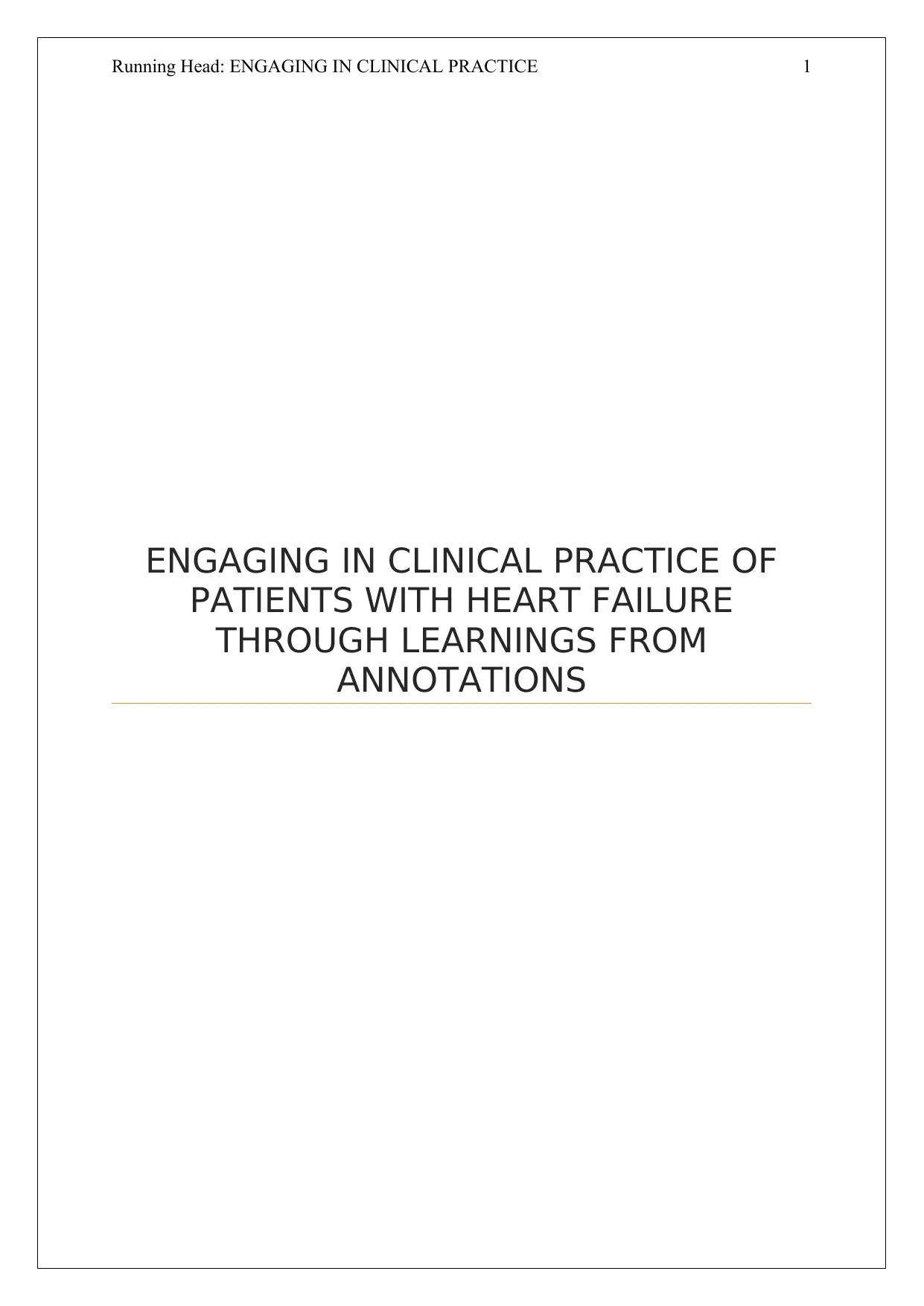
Running Head: ENGAGING IN CLINICAL PRACTICE 1
ENGAGING IN CLINICAL PRACTICE OF
PATIENTS WITH HEART FAILURE
THROUGH LEARNINGS FROM
ANNOTATIONS
ENGAGING IN CLINICAL PRACTICE OF
PATIENTS WITH HEART FAILURE
THROUGH LEARNINGS FROM
ANNOTATIONS
Paraphrase This Document
Need a fresh take? Get an instant paraphrase of this document with our AI Paraphraser
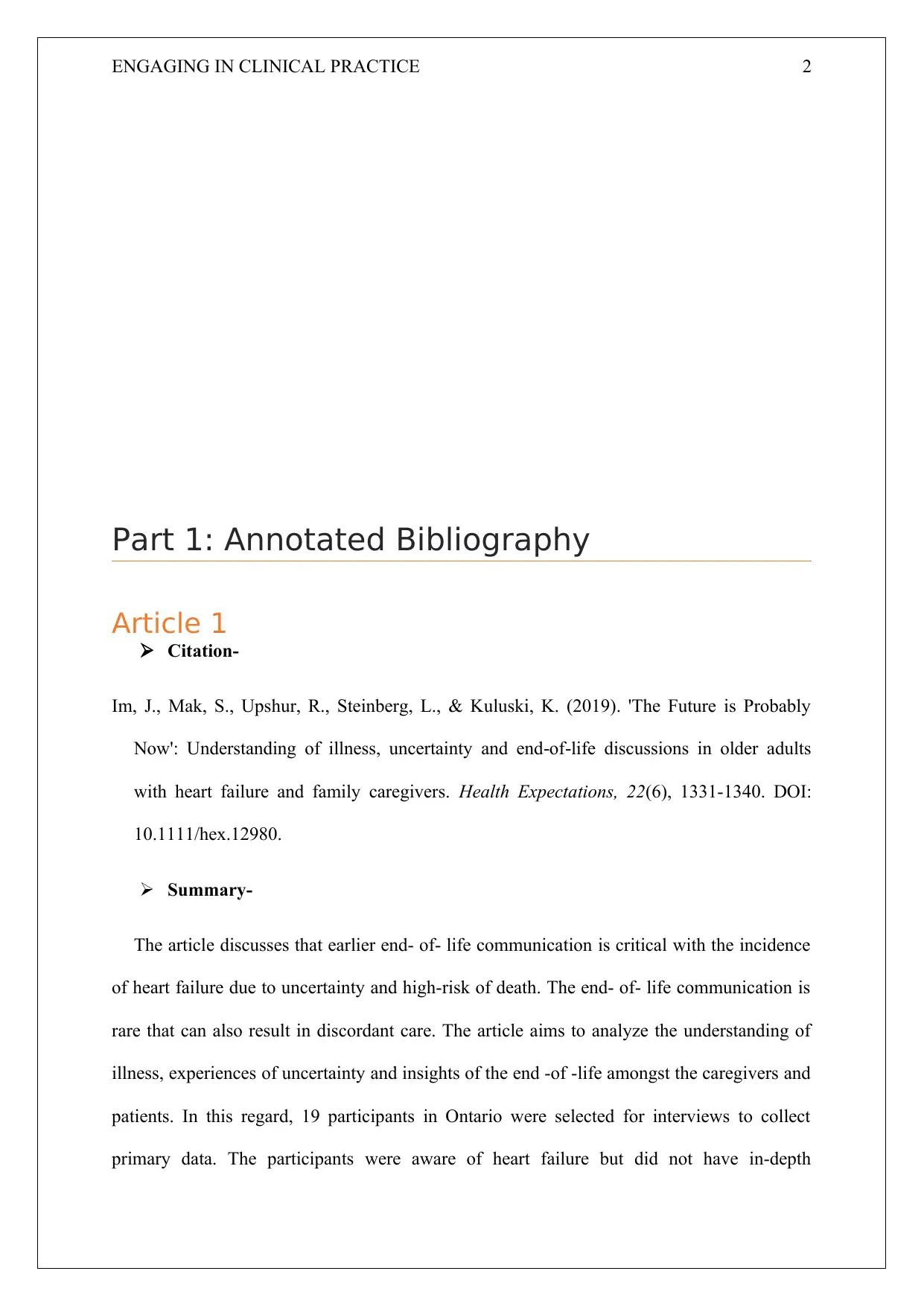
ENGAGING IN CLINICAL PRACTICE 2
Part 1: Annotated Bibliography
Article 1
Citation-
Im, J., Mak, S., Upshur, R., Steinberg, L., & Kuluski, K. (2019). 'The Future is Probably
Now': Understanding of illness, uncertainty and end of life discussions in older adults‐ ‐
with heart failure and family caregivers. Health Expectations, 22(6), 1331-1340. DOI:
10.1111/hex.12980.
Summary-
The article discusses that earlier end- of- life communication is critical with the incidence
of heart failure due to uncertainty and high-risk of death. The end- of- life communication is
rare that can also result in discordant care. The article aims to analyze the understanding of
illness, experiences of uncertainty and insights of the end -of -life amongst the caregivers and
patients. In this regard, 19 participants in Ontario were selected for interviews to collect
primary data. The participants were aware of heart failure but did not have in-depth
Part 1: Annotated Bibliography
Article 1
Citation-
Im, J., Mak, S., Upshur, R., Steinberg, L., & Kuluski, K. (2019). 'The Future is Probably
Now': Understanding of illness, uncertainty and end of life discussions in older adults‐ ‐
with heart failure and family caregivers. Health Expectations, 22(6), 1331-1340. DOI:
10.1111/hex.12980.
Summary-
The article discusses that earlier end- of- life communication is critical with the incidence
of heart failure due to uncertainty and high-risk of death. The end- of- life communication is
rare that can also result in discordant care. The article aims to analyze the understanding of
illness, experiences of uncertainty and insights of the end -of -life amongst the caregivers and
patients. In this regard, 19 participants in Ontario were selected for interviews to collect
primary data. The participants were aware of heart failure but did not have in-depth
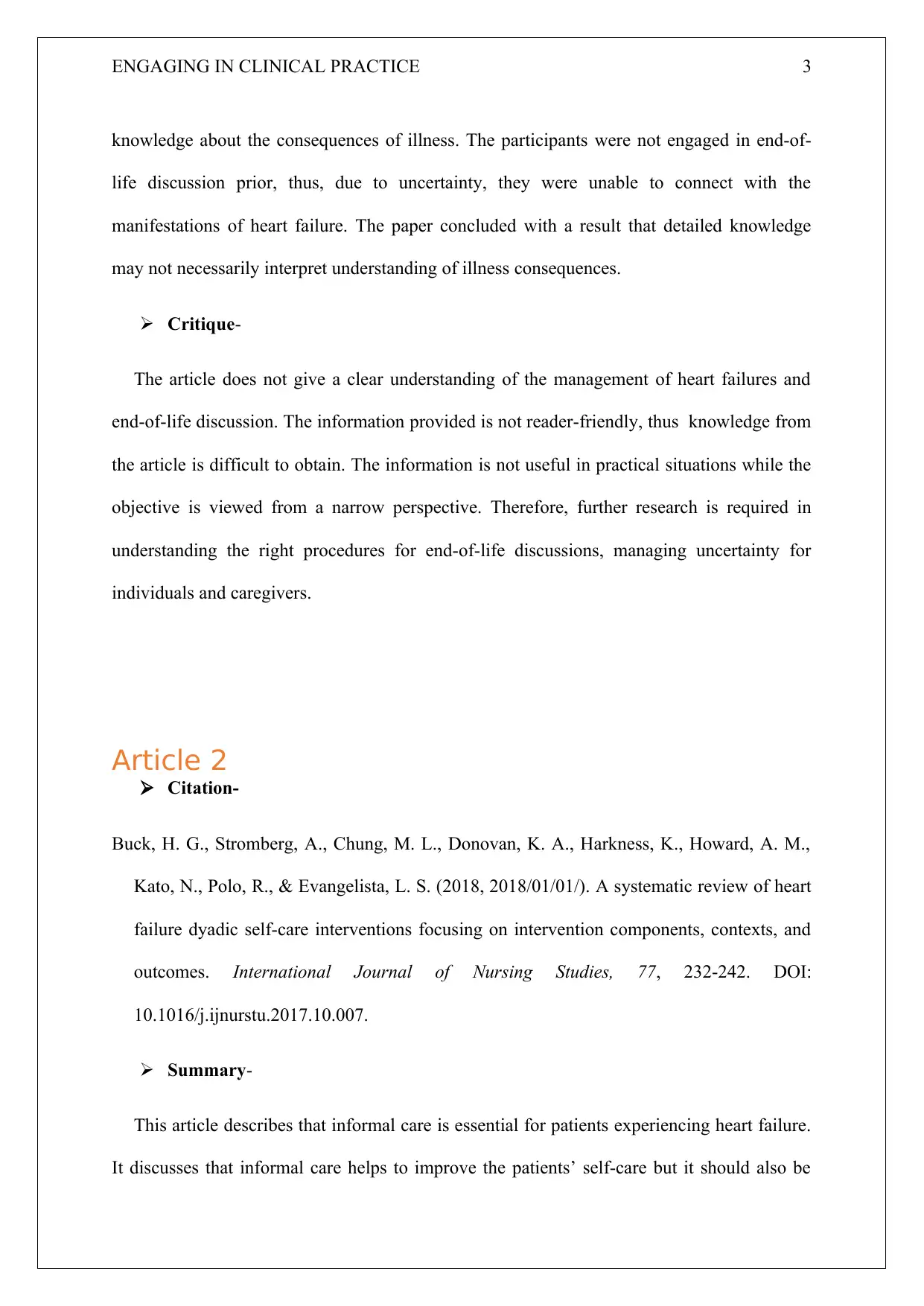
ENGAGING IN CLINICAL PRACTICE 3
knowledge about the consequences of illness. The participants were not engaged in end-of-
life discussion prior, thus, due to uncertainty, they were unable to connect with the
manifestations of heart failure. The paper concluded with a result that detailed knowledge
may not necessarily interpret understanding of illness consequences.
Critique-
The article does not give a clear understanding of the management of heart failures and
end-of-life discussion. The information provided is not reader-friendly, thus knowledge from
the article is difficult to obtain. The information is not useful in practical situations while the
objective is viewed from a narrow perspective. Therefore, further research is required in
understanding the right procedures for end-of-life discussions, managing uncertainty for
individuals and caregivers.
Article 2
Citation-
Buck, H. G., Stromberg, A., Chung, M. L., Donovan, K. A., Harkness, K., Howard, A. M.,
Kato, N., Polo, R., & Evangelista, L. S. (2018, 2018/01/01/). A systematic review of heart
failure dyadic self-care interventions focusing on intervention components, contexts, and
outcomes. International Journal of Nursing Studies, 77, 232-242. DOI:
10.1016/j.ijnurstu.2017.10.007.
Summary-
This article describes that informal care is essential for patients experiencing heart failure.
It discusses that informal care helps to improve the patients’ self-care but it should also be
knowledge about the consequences of illness. The participants were not engaged in end-of-
life discussion prior, thus, due to uncertainty, they were unable to connect with the
manifestations of heart failure. The paper concluded with a result that detailed knowledge
may not necessarily interpret understanding of illness consequences.
Critique-
The article does not give a clear understanding of the management of heart failures and
end-of-life discussion. The information provided is not reader-friendly, thus knowledge from
the article is difficult to obtain. The information is not useful in practical situations while the
objective is viewed from a narrow perspective. Therefore, further research is required in
understanding the right procedures for end-of-life discussions, managing uncertainty for
individuals and caregivers.
Article 2
Citation-
Buck, H. G., Stromberg, A., Chung, M. L., Donovan, K. A., Harkness, K., Howard, A. M.,
Kato, N., Polo, R., & Evangelista, L. S. (2018, 2018/01/01/). A systematic review of heart
failure dyadic self-care interventions focusing on intervention components, contexts, and
outcomes. International Journal of Nursing Studies, 77, 232-242. DOI:
10.1016/j.ijnurstu.2017.10.007.
Summary-
This article describes that informal care is essential for patients experiencing heart failure.
It discusses that informal care helps to improve the patients’ self-care but it should also be
⊘ This is a preview!⊘
Do you want full access?
Subscribe today to unlock all pages.

Trusted by 1+ million students worldwide
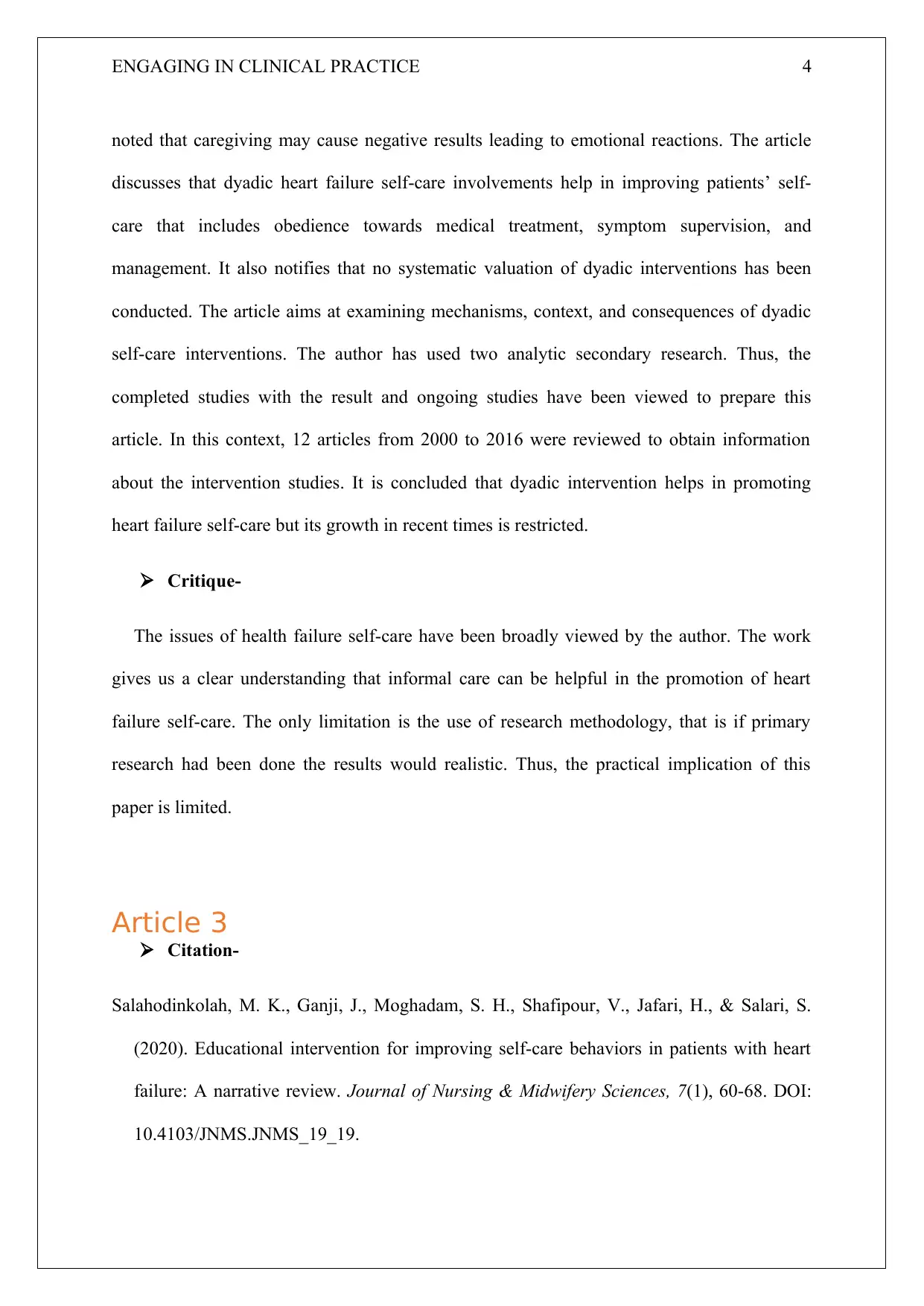
ENGAGING IN CLINICAL PRACTICE 4
noted that caregiving may cause negative results leading to emotional reactions. The article
discusses that dyadic heart failure self-care involvements help in improving patients’ self-
care that includes obedience towards medical treatment, symptom supervision, and
management. It also notifies that no systematic valuation of dyadic interventions has been
conducted. The article aims at examining mechanisms, context, and consequences of dyadic
self-care interventions. The author has used two analytic secondary research. Thus, the
completed studies with the result and ongoing studies have been viewed to prepare this
article. In this context, 12 articles from 2000 to 2016 were reviewed to obtain information
about the intervention studies. It is concluded that dyadic intervention helps in promoting
heart failure self-care but its growth in recent times is restricted.
Critique-
The issues of health failure self-care have been broadly viewed by the author. The work
gives us a clear understanding that informal care can be helpful in the promotion of heart
failure self-care. The only limitation is the use of research methodology, that is if primary
research had been done the results would realistic. Thus, the practical implication of this
paper is limited.
Article 3
Citation-
Salahodinkolah, M. K., Ganji, J., Moghadam, S. H., Shafipour, V., Jafari, H., & Salari, S.
(2020). Educational intervention for improving self-care behaviors in patients with heart
failure: A narrative review. Journal of Nursing & Midwifery Sciences, 7(1), 60-68. DOI:
10.4103/JNMS.JNMS_19_19.
noted that caregiving may cause negative results leading to emotional reactions. The article
discusses that dyadic heart failure self-care involvements help in improving patients’ self-
care that includes obedience towards medical treatment, symptom supervision, and
management. It also notifies that no systematic valuation of dyadic interventions has been
conducted. The article aims at examining mechanisms, context, and consequences of dyadic
self-care interventions. The author has used two analytic secondary research. Thus, the
completed studies with the result and ongoing studies have been viewed to prepare this
article. In this context, 12 articles from 2000 to 2016 were reviewed to obtain information
about the intervention studies. It is concluded that dyadic intervention helps in promoting
heart failure self-care but its growth in recent times is restricted.
Critique-
The issues of health failure self-care have been broadly viewed by the author. The work
gives us a clear understanding that informal care can be helpful in the promotion of heart
failure self-care. The only limitation is the use of research methodology, that is if primary
research had been done the results would realistic. Thus, the practical implication of this
paper is limited.
Article 3
Citation-
Salahodinkolah, M. K., Ganji, J., Moghadam, S. H., Shafipour, V., Jafari, H., & Salari, S.
(2020). Educational intervention for improving self-care behaviors in patients with heart
failure: A narrative review. Journal of Nursing & Midwifery Sciences, 7(1), 60-68. DOI:
10.4103/JNMS.JNMS_19_19.
Paraphrase This Document
Need a fresh take? Get an instant paraphrase of this document with our AI Paraphraser
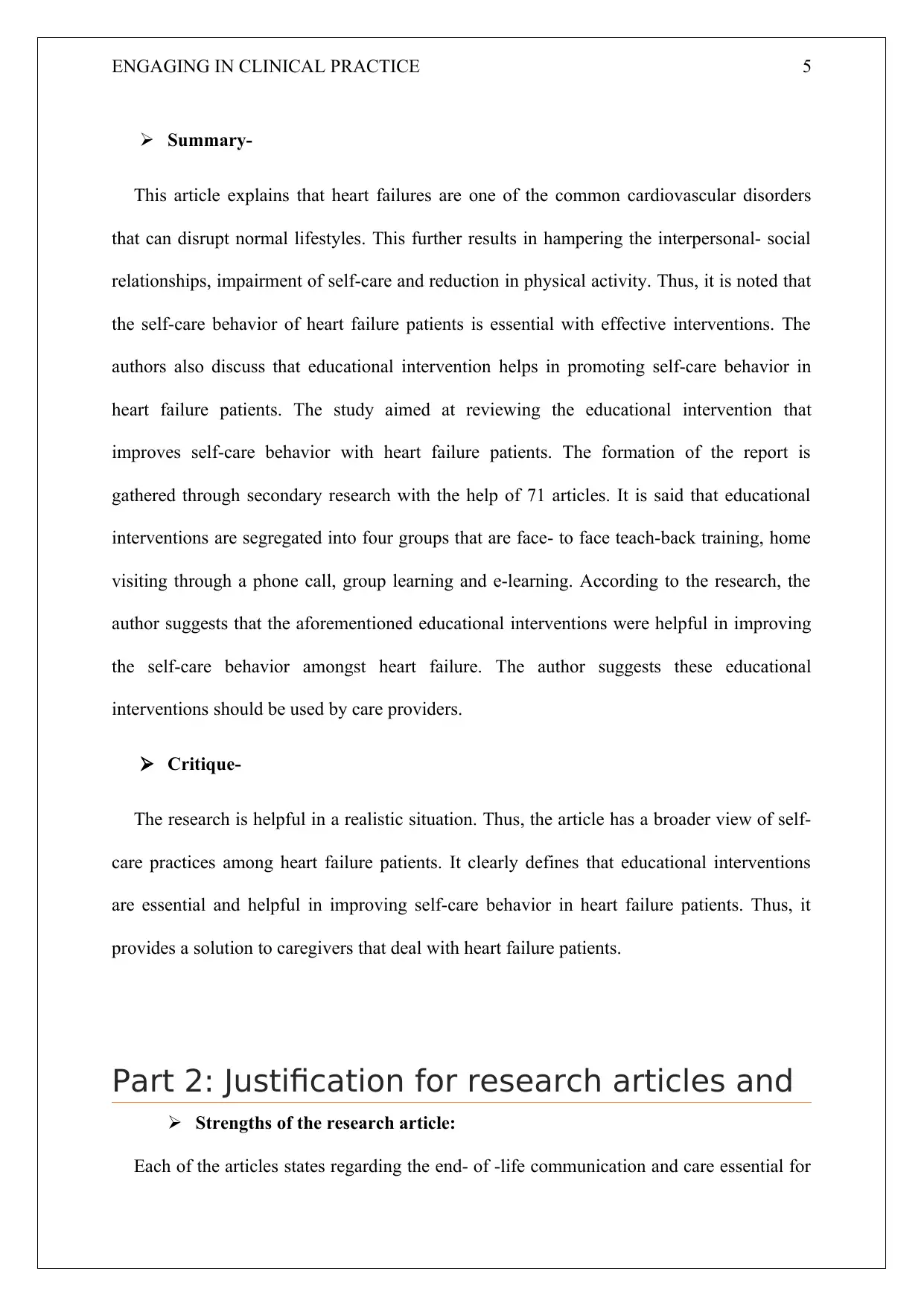
ENGAGING IN CLINICAL PRACTICE 5
Summary-
This article explains that heart failures are one of the common cardiovascular disorders
that can disrupt normal lifestyles. This further results in hampering the interpersonal- social
relationships, impairment of self-care and reduction in physical activity. Thus, it is noted that
the self-care behavior of heart failure patients is essential with effective interventions. The
authors also discuss that educational intervention helps in promoting self-care behavior in
heart failure patients. The study aimed at reviewing the educational intervention that
improves self-care behavior with heart failure patients. The formation of the report is
gathered through secondary research with the help of 71 articles. It is said that educational
interventions are segregated into four groups that are face- to face teach-back training, home
visiting through a phone call, group learning and e-learning. According to the research, the
author suggests that the aforementioned educational interventions were helpful in improving
the self-care behavior amongst heart failure. The author suggests these educational
interventions should be used by care providers.
Critique-
The research is helpful in a realistic situation. Thus, the article has a broader view of self-
care practices among heart failure patients. It clearly defines that educational interventions
are essential and helpful in improving self-care behavior in heart failure patients. Thus, it
provides a solution to caregivers that deal with heart failure patients.
Part 2: Justification for research articles and
Strengths of the research article:
Each of the articles states regarding the end- of -life communication and care essential for
Summary-
This article explains that heart failures are one of the common cardiovascular disorders
that can disrupt normal lifestyles. This further results in hampering the interpersonal- social
relationships, impairment of self-care and reduction in physical activity. Thus, it is noted that
the self-care behavior of heart failure patients is essential with effective interventions. The
authors also discuss that educational intervention helps in promoting self-care behavior in
heart failure patients. The study aimed at reviewing the educational intervention that
improves self-care behavior with heart failure patients. The formation of the report is
gathered through secondary research with the help of 71 articles. It is said that educational
interventions are segregated into four groups that are face- to face teach-back training, home
visiting through a phone call, group learning and e-learning. According to the research, the
author suggests that the aforementioned educational interventions were helpful in improving
the self-care behavior amongst heart failure. The author suggests these educational
interventions should be used by care providers.
Critique-
The research is helpful in a realistic situation. Thus, the article has a broader view of self-
care practices among heart failure patients. It clearly defines that educational interventions
are essential and helpful in improving self-care behavior in heart failure patients. Thus, it
provides a solution to caregivers that deal with heart failure patients.
Part 2: Justification for research articles and
Strengths of the research article:
Each of the articles states regarding the end- of -life communication and care essential for
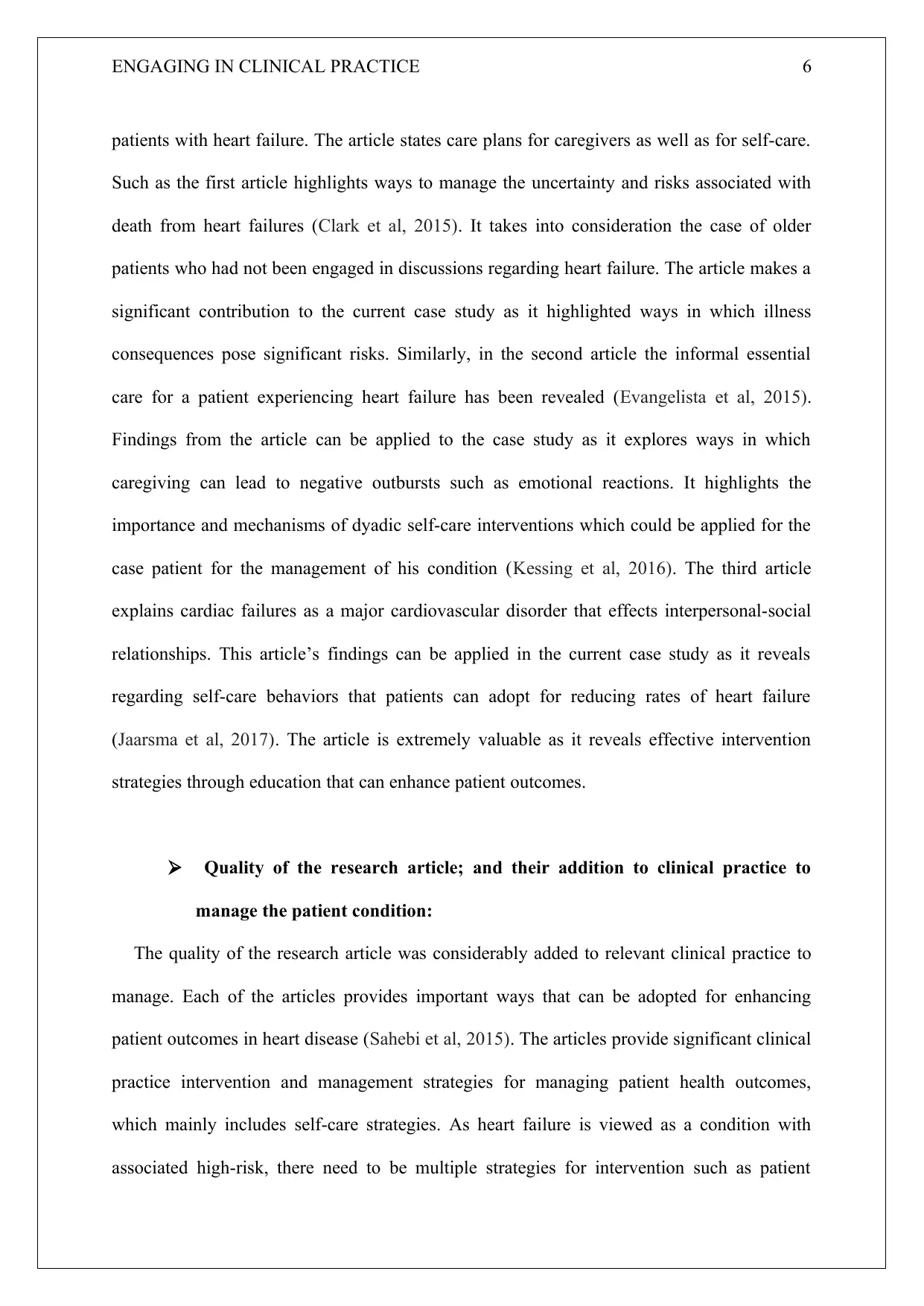
ENGAGING IN CLINICAL PRACTICE 6
patients with heart failure. The article states care plans for caregivers as well as for self-care.
Such as the first article highlights ways to manage the uncertainty and risks associated with
death from heart failures (Clark et al, 2015). It takes into consideration the case of older
patients who had not been engaged in discussions regarding heart failure. The article makes a
significant contribution to the current case study as it highlighted ways in which illness
consequences pose significant risks. Similarly, in the second article the informal essential
care for a patient experiencing heart failure has been revealed (Evangelista et al, 2015).
Findings from the article can be applied to the case study as it explores ways in which
caregiving can lead to negative outbursts such as emotional reactions. It highlights the
importance and mechanisms of dyadic self-care interventions which could be applied for the
case patient for the management of his condition (Kessing et al, 2016). The third article
explains cardiac failures as a major cardiovascular disorder that effects interpersonal-social
relationships. This article’s findings can be applied in the current case study as it reveals
regarding self-care behaviors that patients can adopt for reducing rates of heart failure
(Jaarsma et al, 2017). The article is extremely valuable as it reveals effective intervention
strategies through education that can enhance patient outcomes.
Quality of the research article; and their addition to clinical practice to
manage the patient condition:
The quality of the research article was considerably added to relevant clinical practice to
manage. Each of the articles provides important ways that can be adopted for enhancing
patient outcomes in heart disease (Sahebi et al, 2015). The articles provide significant clinical
practice intervention and management strategies for managing patient health outcomes,
which mainly includes self-care strategies. As heart failure is viewed as a condition with
associated high-risk, there need to be multiple strategies for intervention such as patient
patients with heart failure. The article states care plans for caregivers as well as for self-care.
Such as the first article highlights ways to manage the uncertainty and risks associated with
death from heart failures (Clark et al, 2015). It takes into consideration the case of older
patients who had not been engaged in discussions regarding heart failure. The article makes a
significant contribution to the current case study as it highlighted ways in which illness
consequences pose significant risks. Similarly, in the second article the informal essential
care for a patient experiencing heart failure has been revealed (Evangelista et al, 2015).
Findings from the article can be applied to the case study as it explores ways in which
caregiving can lead to negative outbursts such as emotional reactions. It highlights the
importance and mechanisms of dyadic self-care interventions which could be applied for the
case patient for the management of his condition (Kessing et al, 2016). The third article
explains cardiac failures as a major cardiovascular disorder that effects interpersonal-social
relationships. This article’s findings can be applied in the current case study as it reveals
regarding self-care behaviors that patients can adopt for reducing rates of heart failure
(Jaarsma et al, 2017). The article is extremely valuable as it reveals effective intervention
strategies through education that can enhance patient outcomes.
Quality of the research article; and their addition to clinical practice to
manage the patient condition:
The quality of the research article was considerably added to relevant clinical practice to
manage. Each of the articles provides important ways that can be adopted for enhancing
patient outcomes in heart disease (Sahebi et al, 2015). The articles provide significant clinical
practice intervention and management strategies for managing patient health outcomes,
which mainly includes self-care strategies. As heart failure is viewed as a condition with
associated high-risk, there need to be multiple strategies for intervention such as patient
⊘ This is a preview!⊘
Do you want full access?
Subscribe today to unlock all pages.

Trusted by 1+ million students worldwide
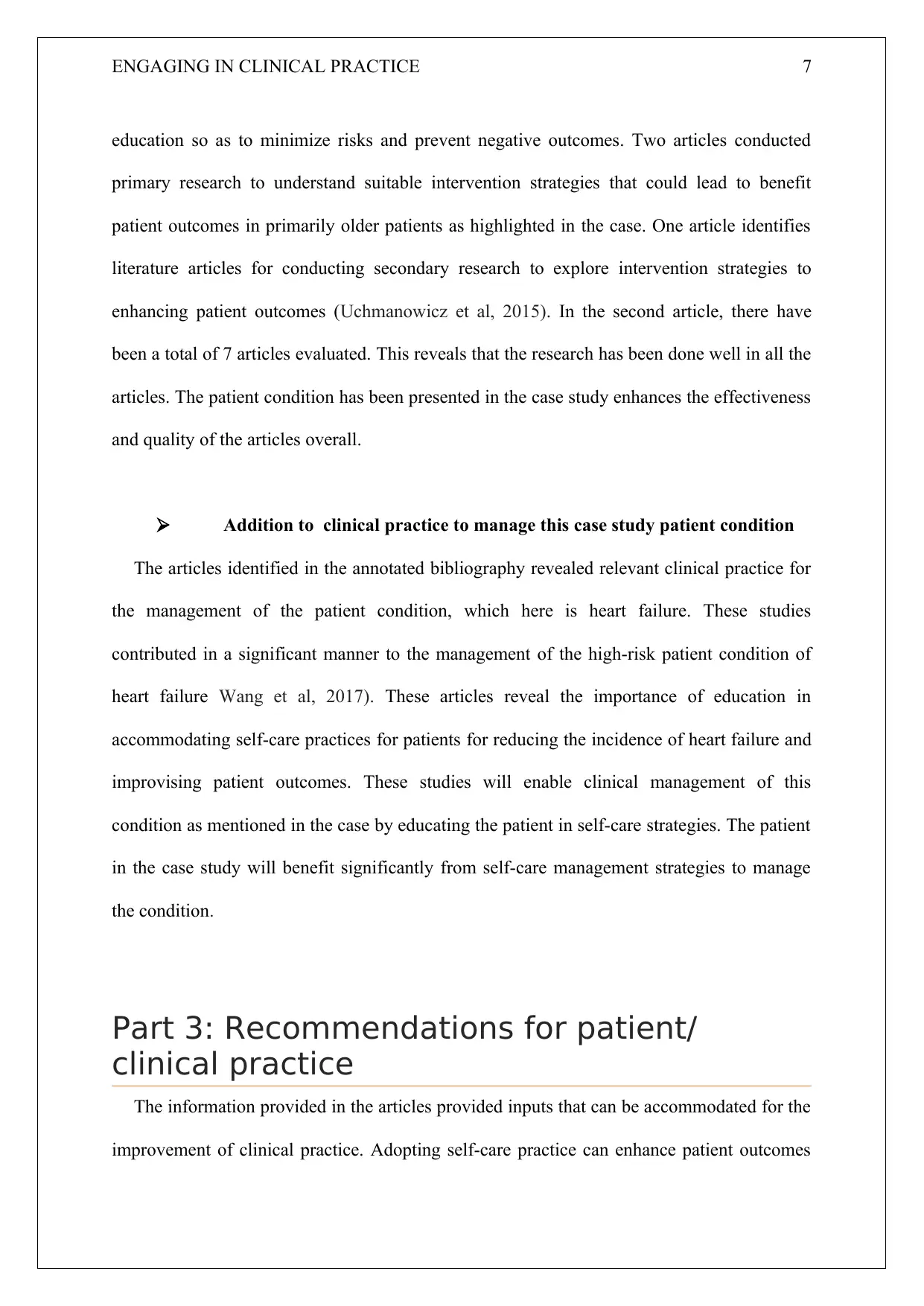
ENGAGING IN CLINICAL PRACTICE 7
education so as to minimize risks and prevent negative outcomes. Two articles conducted
primary research to understand suitable intervention strategies that could lead to benefit
patient outcomes in primarily older patients as highlighted in the case. One article identifies
literature articles for conducting secondary research to explore intervention strategies to
enhancing patient outcomes (Uchmanowicz et al, 2015). In the second article, there have
been a total of 7 articles evaluated. This reveals that the research has been done well in all the
articles. The patient condition has been presented in the case study enhances the effectiveness
and quality of the articles overall.
Addition to clinical practice to manage this case study patient condition
The articles identified in the annotated bibliography revealed relevant clinical practice for
the management of the patient condition, which here is heart failure. These studies
contributed in a significant manner to the management of the high-risk patient condition of
heart failure Wang et al, 2017). These articles reveal the importance of education in
accommodating self-care practices for patients for reducing the incidence of heart failure and
improvising patient outcomes. These studies will enable clinical management of this
condition as mentioned in the case by educating the patient in self-care strategies. The patient
in the case study will benefit significantly from self-care management strategies to manage
the condition.
Part 3: Recommendations for patient/
clinical practice
The information provided in the articles provided inputs that can be accommodated for the
improvement of clinical practice. Adopting self-care practice can enhance patient outcomes
education so as to minimize risks and prevent negative outcomes. Two articles conducted
primary research to understand suitable intervention strategies that could lead to benefit
patient outcomes in primarily older patients as highlighted in the case. One article identifies
literature articles for conducting secondary research to explore intervention strategies to
enhancing patient outcomes (Uchmanowicz et al, 2015). In the second article, there have
been a total of 7 articles evaluated. This reveals that the research has been done well in all the
articles. The patient condition has been presented in the case study enhances the effectiveness
and quality of the articles overall.
Addition to clinical practice to manage this case study patient condition
The articles identified in the annotated bibliography revealed relevant clinical practice for
the management of the patient condition, which here is heart failure. These studies
contributed in a significant manner to the management of the high-risk patient condition of
heart failure Wang et al, 2017). These articles reveal the importance of education in
accommodating self-care practices for patients for reducing the incidence of heart failure and
improvising patient outcomes. These studies will enable clinical management of this
condition as mentioned in the case by educating the patient in self-care strategies. The patient
in the case study will benefit significantly from self-care management strategies to manage
the condition.
Part 3: Recommendations for patient/
clinical practice
The information provided in the articles provided inputs that can be accommodated for the
improvement of clinical practice. Adopting self-care practice can enhance patient outcomes
Paraphrase This Document
Need a fresh take? Get an instant paraphrase of this document with our AI Paraphraser
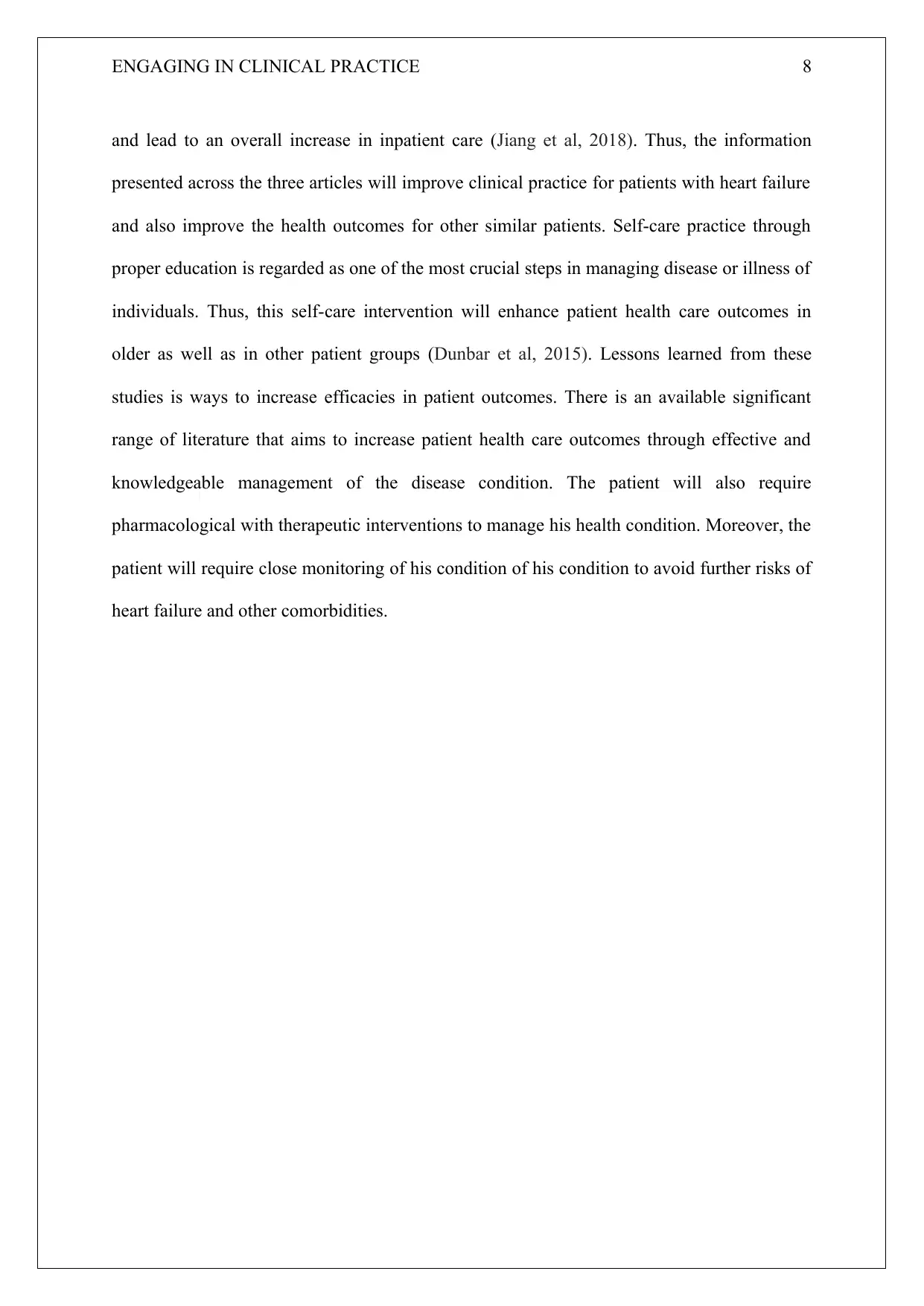
ENGAGING IN CLINICAL PRACTICE 8
and lead to an overall increase in inpatient care (Jiang et al, 2018). Thus, the information
presented across the three articles will improve clinical practice for patients with heart failure
and also improve the health outcomes for other similar patients. Self-care practice through
proper education is regarded as one of the most crucial steps in managing disease or illness of
individuals. Thus, this self-care intervention will enhance patient health care outcomes in
older as well as in other patient groups (Dunbar et al, 2015). Lessons learned from these
studies is ways to increase efficacies in patient outcomes. There is an available significant
range of literature that aims to increase patient health care outcomes through effective and
knowledgeable management of the disease condition. The patient will also require
pharmacological with therapeutic interventions to manage his health condition. Moreover, the
patient will require close monitoring of his condition of his condition to avoid further risks of
heart failure and other comorbidities.
and lead to an overall increase in inpatient care (Jiang et al, 2018). Thus, the information
presented across the three articles will improve clinical practice for patients with heart failure
and also improve the health outcomes for other similar patients. Self-care practice through
proper education is regarded as one of the most crucial steps in managing disease or illness of
individuals. Thus, this self-care intervention will enhance patient health care outcomes in
older as well as in other patient groups (Dunbar et al, 2015). Lessons learned from these
studies is ways to increase efficacies in patient outcomes. There is an available significant
range of literature that aims to increase patient health care outcomes through effective and
knowledgeable management of the disease condition. The patient will also require
pharmacological with therapeutic interventions to manage his health condition. Moreover, the
patient will require close monitoring of his condition of his condition to avoid further risks of
heart failure and other comorbidities.
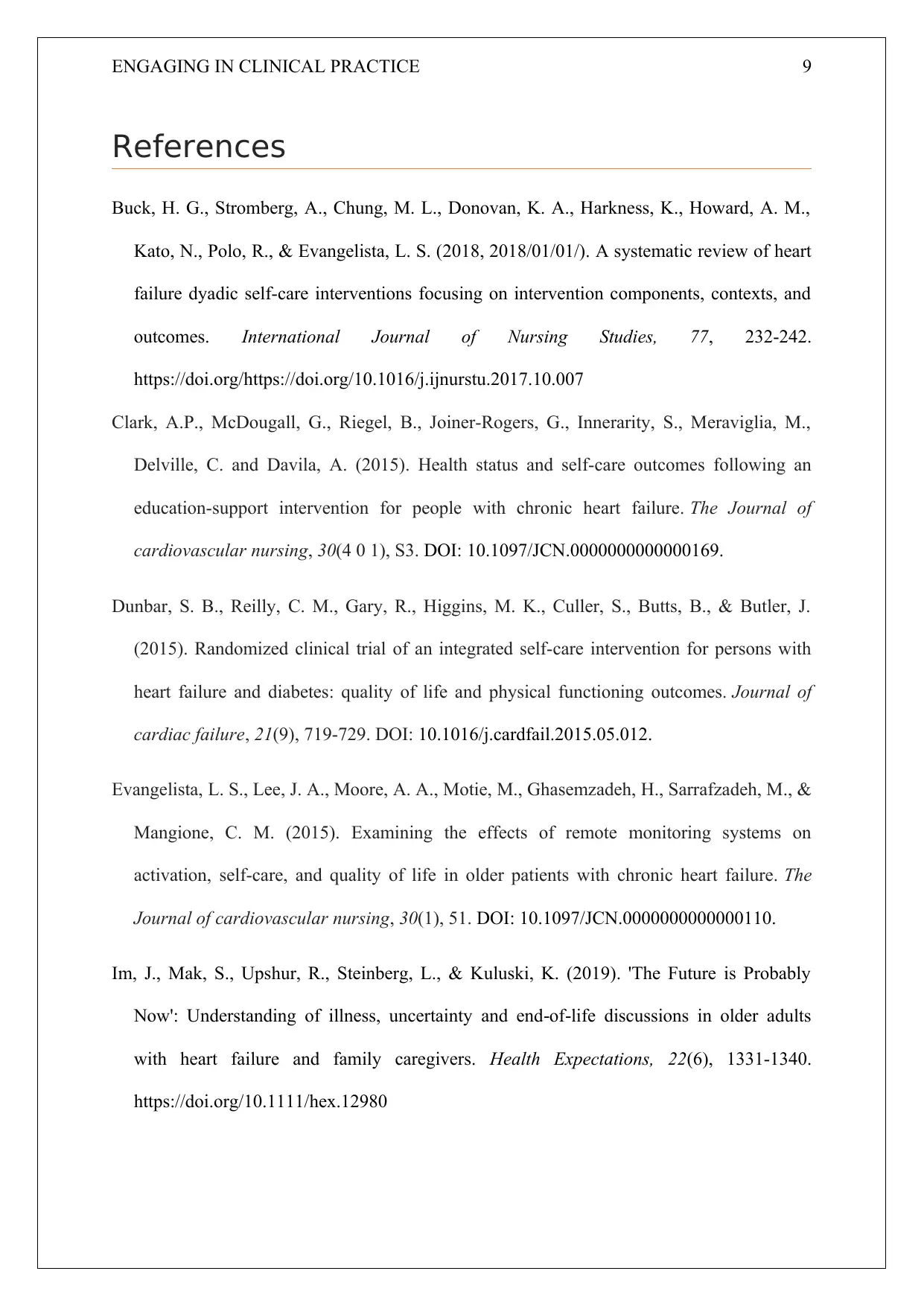
ENGAGING IN CLINICAL PRACTICE 9
References
Buck, H. G., Stromberg, A., Chung, M. L., Donovan, K. A., Harkness, K., Howard, A. M.,
Kato, N., Polo, R., & Evangelista, L. S. (2018, 2018/01/01/). A systematic review of heart
failure dyadic self-care interventions focusing on intervention components, contexts, and
outcomes. International Journal of Nursing Studies, 77, 232-242.
https://doi.org/https://doi.org/10.1016/j.ijnurstu.2017.10.007
Clark, A.P., McDougall, G., Riegel, B., Joiner-Rogers, G., Innerarity, S., Meraviglia, M.,
Delville, C. and Davila, A. (2015). Health status and self-care outcomes following an
education-support intervention for people with chronic heart failure. The Journal of
cardiovascular nursing, 30(4 0 1), S3. DOI: 10.1097/JCN.0000000000000169.
Dunbar, S. B., Reilly, C. M., Gary, R., Higgins, M. K., Culler, S., Butts, B., & Butler, J.
(2015). Randomized clinical trial of an integrated self-care intervention for persons with
heart failure and diabetes: quality of life and physical functioning outcomes. Journal of
cardiac failure, 21(9), 719-729. DOI: 10.1016/j.cardfail.2015.05.012.
Evangelista, L. S., Lee, J. A., Moore, A. A., Motie, M., Ghasemzadeh, H., Sarrafzadeh, M., &
Mangione, C. M. (2015). Examining the effects of remote monitoring systems on
activation, self-care, and quality of life in older patients with chronic heart failure. The
Journal of cardiovascular nursing, 30(1), 51. DOI: 10.1097/JCN.0000000000000110.
Im, J., Mak, S., Upshur, R., Steinberg, L., & Kuluski, K. (2019). 'The Future is Probably
Now': Understanding of illness, uncertainty and end of life discussions in older adults‐ ‐
with heart failure and family caregivers. Health Expectations, 22(6), 1331-1340.
https://doi.org/10.1111/hex.12980
References
Buck, H. G., Stromberg, A., Chung, M. L., Donovan, K. A., Harkness, K., Howard, A. M.,
Kato, N., Polo, R., & Evangelista, L. S. (2018, 2018/01/01/). A systematic review of heart
failure dyadic self-care interventions focusing on intervention components, contexts, and
outcomes. International Journal of Nursing Studies, 77, 232-242.
https://doi.org/https://doi.org/10.1016/j.ijnurstu.2017.10.007
Clark, A.P., McDougall, G., Riegel, B., Joiner-Rogers, G., Innerarity, S., Meraviglia, M.,
Delville, C. and Davila, A. (2015). Health status and self-care outcomes following an
education-support intervention for people with chronic heart failure. The Journal of
cardiovascular nursing, 30(4 0 1), S3. DOI: 10.1097/JCN.0000000000000169.
Dunbar, S. B., Reilly, C. M., Gary, R., Higgins, M. K., Culler, S., Butts, B., & Butler, J.
(2015). Randomized clinical trial of an integrated self-care intervention for persons with
heart failure and diabetes: quality of life and physical functioning outcomes. Journal of
cardiac failure, 21(9), 719-729. DOI: 10.1016/j.cardfail.2015.05.012.
Evangelista, L. S., Lee, J. A., Moore, A. A., Motie, M., Ghasemzadeh, H., Sarrafzadeh, M., &
Mangione, C. M. (2015). Examining the effects of remote monitoring systems on
activation, self-care, and quality of life in older patients with chronic heart failure. The
Journal of cardiovascular nursing, 30(1), 51. DOI: 10.1097/JCN.0000000000000110.
Im, J., Mak, S., Upshur, R., Steinberg, L., & Kuluski, K. (2019). 'The Future is Probably
Now': Understanding of illness, uncertainty and end of life discussions in older adults‐ ‐
with heart failure and family caregivers. Health Expectations, 22(6), 1331-1340.
https://doi.org/10.1111/hex.12980
⊘ This is a preview!⊘
Do you want full access?
Subscribe today to unlock all pages.

Trusted by 1+ million students worldwide
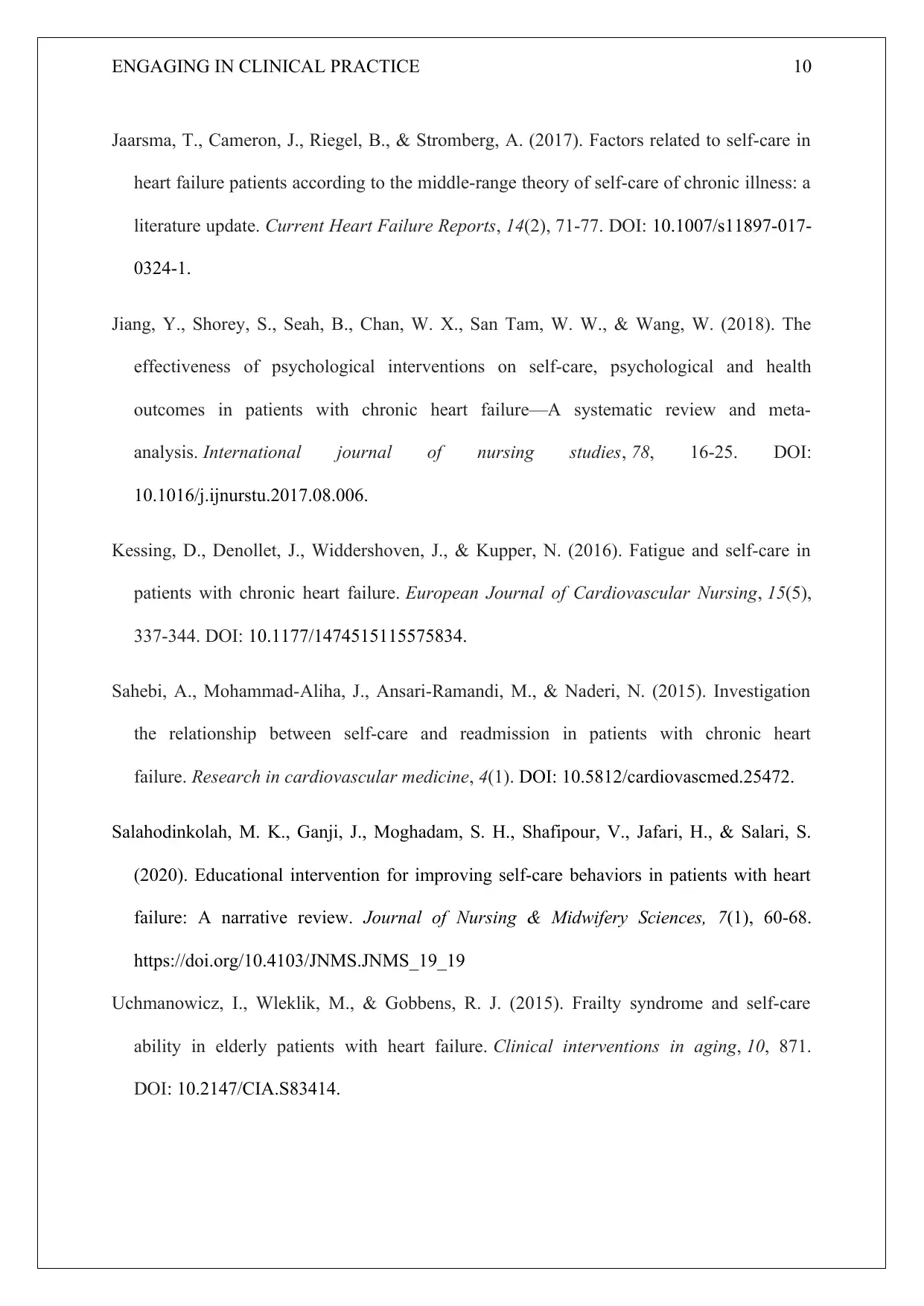
ENGAGING IN CLINICAL PRACTICE 10
Jaarsma, T., Cameron, J., Riegel, B., & Stromberg, A. (2017). Factors related to self-care in
heart failure patients according to the middle-range theory of self-care of chronic illness: a
literature update. Current Heart Failure Reports, 14(2), 71-77. DOI: 10.1007/s11897-017-
0324-1.
Jiang, Y., Shorey, S., Seah, B., Chan, W. X., San Tam, W. W., & Wang, W. (2018). The
effectiveness of psychological interventions on self-care, psychological and health
outcomes in patients with chronic heart failure—A systematic review and meta-
analysis. International journal of nursing studies, 78, 16-25. DOI:
10.1016/j.ijnurstu.2017.08.006.
Kessing, D., Denollet, J., Widdershoven, J., & Kupper, N. (2016). Fatigue and self-care in
patients with chronic heart failure. European Journal of Cardiovascular Nursing, 15(5),
337-344. DOI: 10.1177/1474515115575834.
Sahebi, A., Mohammad-Aliha, J., Ansari-Ramandi, M., & Naderi, N. (2015). Investigation
the relationship between self-care and readmission in patients with chronic heart
failure. Research in cardiovascular medicine, 4(1). DOI: 10.5812/cardiovascmed.25472.
Salahodinkolah, M. K., Ganji, J., Moghadam, S. H., Shafipour, V., Jafari, H., & Salari, S.
(2020). Educational intervention for improving self-care behaviors in patients with heart
failure: A narrative review. Journal of Nursing & Midwifery Sciences, 7(1), 60-68.
https://doi.org/10.4103/JNMS.JNMS_19_19
Uchmanowicz, I., Wleklik, M., & Gobbens, R. J. (2015). Frailty syndrome and self-care
ability in elderly patients with heart failure. Clinical interventions in aging, 10, 871.
DOI: 10.2147/CIA.S83414.
Jaarsma, T., Cameron, J., Riegel, B., & Stromberg, A. (2017). Factors related to self-care in
heart failure patients according to the middle-range theory of self-care of chronic illness: a
literature update. Current Heart Failure Reports, 14(2), 71-77. DOI: 10.1007/s11897-017-
0324-1.
Jiang, Y., Shorey, S., Seah, B., Chan, W. X., San Tam, W. W., & Wang, W. (2018). The
effectiveness of psychological interventions on self-care, psychological and health
outcomes in patients with chronic heart failure—A systematic review and meta-
analysis. International journal of nursing studies, 78, 16-25. DOI:
10.1016/j.ijnurstu.2017.08.006.
Kessing, D., Denollet, J., Widdershoven, J., & Kupper, N. (2016). Fatigue and self-care in
patients with chronic heart failure. European Journal of Cardiovascular Nursing, 15(5),
337-344. DOI: 10.1177/1474515115575834.
Sahebi, A., Mohammad-Aliha, J., Ansari-Ramandi, M., & Naderi, N. (2015). Investigation
the relationship between self-care and readmission in patients with chronic heart
failure. Research in cardiovascular medicine, 4(1). DOI: 10.5812/cardiovascmed.25472.
Salahodinkolah, M. K., Ganji, J., Moghadam, S. H., Shafipour, V., Jafari, H., & Salari, S.
(2020). Educational intervention for improving self-care behaviors in patients with heart
failure: A narrative review. Journal of Nursing & Midwifery Sciences, 7(1), 60-68.
https://doi.org/10.4103/JNMS.JNMS_19_19
Uchmanowicz, I., Wleklik, M., & Gobbens, R. J. (2015). Frailty syndrome and self-care
ability in elderly patients with heart failure. Clinical interventions in aging, 10, 871.
DOI: 10.2147/CIA.S83414.
Paraphrase This Document
Need a fresh take? Get an instant paraphrase of this document with our AI Paraphraser
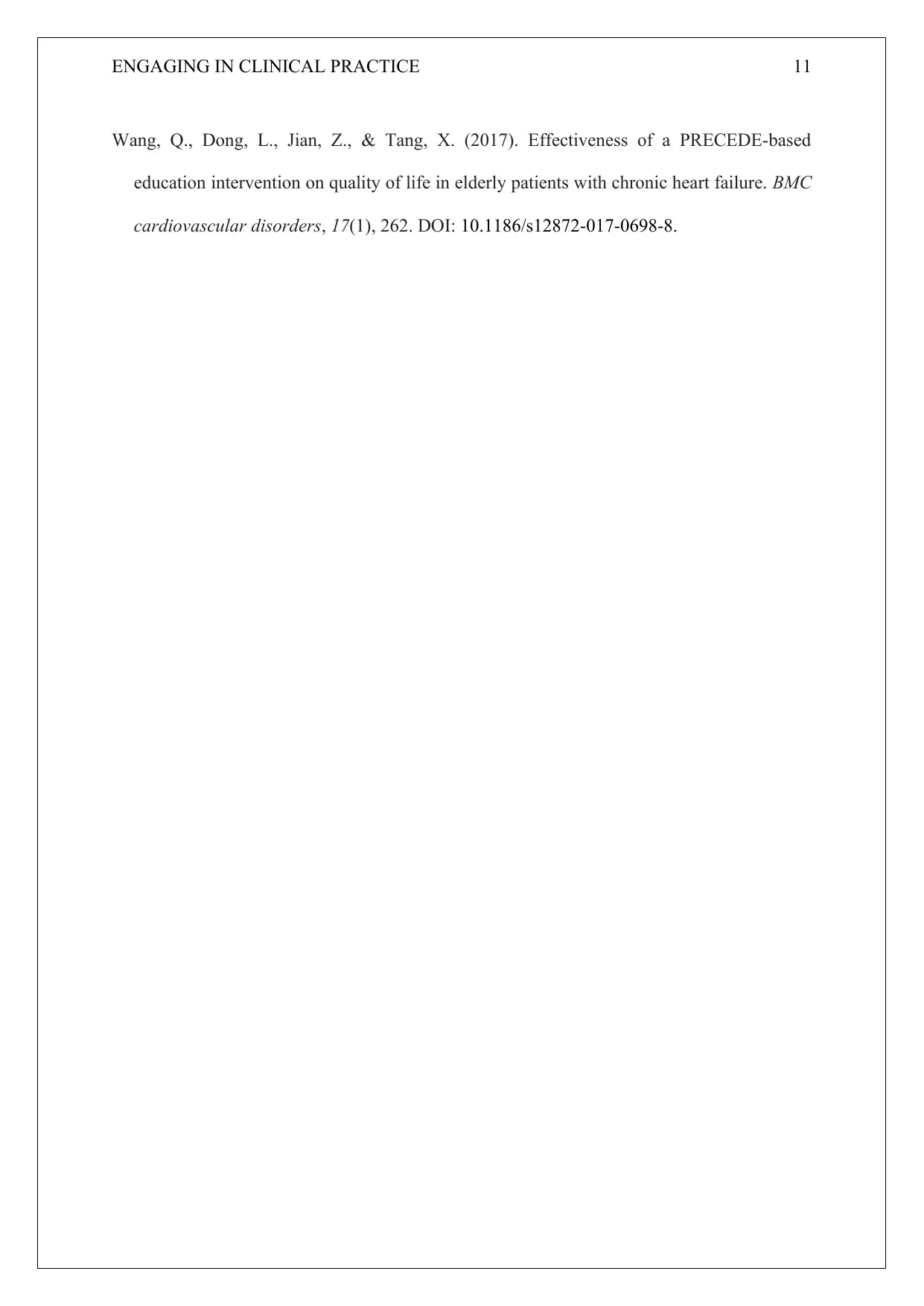
ENGAGING IN CLINICAL PRACTICE 11
Wang, Q., Dong, L., Jian, Z., & Tang, X. (2017). Effectiveness of a PRECEDE-based
education intervention on quality of life in elderly patients with chronic heart failure. BMC
cardiovascular disorders, 17(1), 262. DOI: 10.1186/s12872-017-0698-8.
Wang, Q., Dong, L., Jian, Z., & Tang, X. (2017). Effectiveness of a PRECEDE-based
education intervention on quality of life in elderly patients with chronic heart failure. BMC
cardiovascular disorders, 17(1), 262. DOI: 10.1186/s12872-017-0698-8.
1 out of 11
Related Documents
Your All-in-One AI-Powered Toolkit for Academic Success.
+13062052269
info@desklib.com
Available 24*7 on WhatsApp / Email
![[object Object]](/_next/static/media/star-bottom.7253800d.svg)
Unlock your academic potential
Copyright © 2020–2026 A2Z Services. All Rights Reserved. Developed and managed by ZUCOL.





